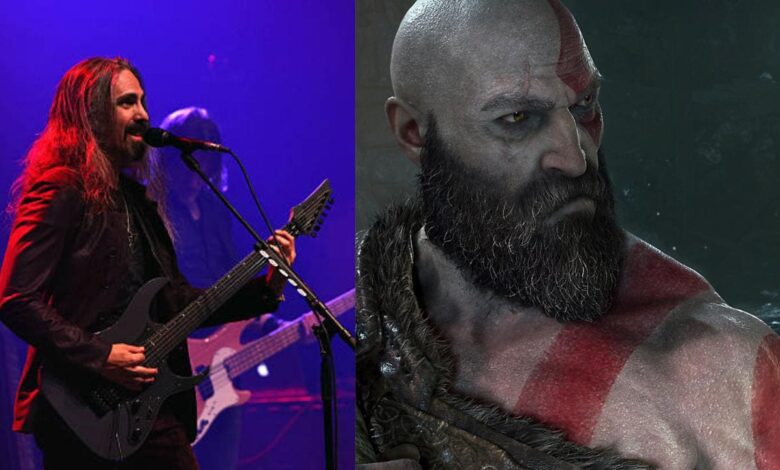“There Was A Power Fantasy That The Music Helped Codify”

📝 usncan Note: “There Was A Power Fantasy That The Music Helped Codify”
Disclaimer: This content has been prepared based on currently trending topics to increase your awareness.
For twenty years, the rage-fuelled God Kratos has smashed his way across our screens. His first appearance came in 2005’s God of War, a PlayStation 2 game wholly unique at the time that boasted visceral (and very gory) combat, innovative level design and a character focused story with depth.
Central to that game’s success was its music. The score, composed by a team led by Gerard K Marino, was cinematic in a way that replicated historical epics like Gladiator that permeated cinema at the time.
Marino’s work on the series is being celebrated in a 13-disc vinyl collection by Sony’s Santa Monica Studio and Laced Records, a company known for turning video game scores into glossy records. It’ll be the first time the music for the first three God of War games will be available physically.
Included in that package is the music from 2018’s God of War and its sequel, God of War Ragnarök. Ahead of its release at the end of October, I spoke with Bear McCreary, the Emmy Award winning composer who had the mammoth task of following in Marino’s footsteps on both of those games.
McCreary is a celebrated TV and film composer having worked on the likes of The Walking Dead and Battlestar Galactica. He also released a rock concept album in 2024 called The Singularity which featured the likes of Slipknot’s Corey Taylor and the iconic guitarist, Slash.
What was it about the God of War (2018) project that initially drew you to it?
I am a very narrative driven musician. Even when I was a kid, I wrote imaginary film music cues. There’s a track on my record, The Singularity which came out last year called Escape From The Machines. I wrote that when I was 16 because I was imagining a Terminator-like future war. I can’t separate narrative from music.
So when I got a call from Sony to come and meet with Santa Monica Studio, which included Corey Barlog, I immediately thought the alignment was interesting. Corey told me this story about an estranged father and son who are dealing with grief and forming their relationship as an adventure unfolds. I thought it was in my wheelhouse because it’s a story and I understood the characters. I was so riveted. I was practically ready to start working there on the spot.
As a character, Kratos is a different animal in the 2018 game when compared to previous iterations. At the beginning of the game, he’s toned down and it takes a while to unearth his inner rage again. He’s a father now too. There’s many different emotions and characteristics in him that are deeper – where did you start with conveying that to the player through music?
The first thing we tried doing was to go in the opposite direction from everything that Gerard Marino and all the other talented composers that worked with Kratos before had done. I set out to write a theme that was very scaled down and intimate. It was a gentle waltz inspired by Nordic folk music that featured a female singer humming a lullaby. The development team eventually asked me to throw it out as it only captured some of what was happening in the game.
I wrote something new for Kratos which borrowed a lot of the emotional tone from that first draft and then everything clicked into place. For a while we thought we had it and another year went by but it still felt like something was missing.
Eventually, I was shown a cinematic where Atreus is mourning the loss of his mother. He’s at her body lighting the candles and Kratos walks in and carries her body to the funeral pyre. I thought the original theme I wrote that had been scrapped would be perfect for this scene so I added it back in without telling anyone. It became Faye’s theme and a part of Kratos’ musical identity in the Norse saga – I expanded upon it in Ragnarok’s first track. It’s like a musical tattoo – the character has this permanent memory of his family from Greece as well as a stamp on him from Faye and Atreus. So it took several themes to be able to convey a story as layered and nuanced as what Corey and his team developed.
Did you find yourself drawing from the scores of Gerard Marino and other composers at any point during the project?
Yes. We went in the other direction for the earliest draft, but when I eventually wrote the main theme for Kratos and the Norse saga, I was returning to the vibe of the earlier games. The reason that the theme I originally sketched was so bold and ultimately ineffective was because it only played with surface emotion of grief and stoicism; it needed to have power.
I sat back and remembered the way those old scores made me feel. There was a power fantasy that the music helped codify. With that said, there were still no overt references to the old themes until we got to Valhalla. That DLC really let me return to the work that Marino and his team had crafted in a way that was really satisfying.
As a composer, what is it like getting to tap into a character’s rage and channeling that musically?
I’m rooted in character so I find that the rage and energy level is more satisfying once we know who the character is, what he loves and what he cares about. That’s what made the Norse saga so special to me; I got to spend time writing themes for characters like Faye who doesn’t even appear in the first game (and barely in the sequel), but nevertheless that grounded the story.
But then there’s those moments in the game, like when Baldur is threatening Atreus and as Kratos, you’re restrained. Then you see the L3+R3 icon come up on the screen and you know shit is about to hit the fan. That’s so satisfying, not just because it’s angry but because we’re going to protect our son, a character we have built a bond with. I feel like I got to be partially responsible for that bond which means I now get to take part in the catharsis of rage mode.
How did you go about conveying the ambience we get from the game’s Norse mythological world?
I told Corey when I met him that I was not an expert in Norse folk music but I asked him for a few days to do a deep dive on Nordic music. I found that one of the instruments often featured there is the hurdy-gurdy, which I just so happened to play. There’s also an instrument called a nickel harper which became a core part of the game’s score.
We recorded with Schola Cantorum, one of Iceland’s national choirs because we wanted the language of the game’s song’s to be in old Norse. We could have recorded in London but they would have had to learn it phonetically; Iceland’s geographical location means that its language evolved differently to continental Europe so Icelandic speakers can read old Norse with minimal changes.
So I went to great pains to make sure that Nordic traditions were represented. Plus, there’s something about these sounds like the nickel harper and the harbinger fiddle – when I hear them, I see the lake of nine and the snow capped peaks in the distance. I get cold. The brisk air coming off of a glacier is somehow captured in these instruments. There’s something magical about them.




